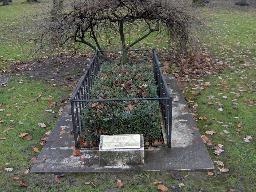Calvin, Jean |
| CHURCH REFORMER (FRANCE) |
|
BORN 10 Jul 1509, Noyon, Oise - DIED 27 May 1564, Genève BIRTH NAME Cauvin, Jean GRAVE LOCATION Genève, Genève: Cimetière de Plainpalais, Rue des Rois (G-707) |
|
Jean Calvin was born in Noyon as the son of an attorney who was also the business administrator of Noyon Cathedral. He was a good student and a religious young man. When he was 14 he sent his son to study theology but when he lost his position with the cathedral he asked his son to study law. Calvin became a Doctor of Law at Orléans in 1532. At an unknown moment in time he converted to Protestantism. He befriended Nicholas Cop, the rector of the University of Paris, who was also Protestant. In 1533 Cop fled Paris and Calvin soon followed his example and went to Louis du Tillet at Angoulême. He moved to Basel for a while and there he published the first version of his "The Institutes" in 1536. After a short return to France he had to leave again and passed Geneva. There Guillaume Farel persuaded him to stay. In 1538 he was expelled and he went to Strassbourg to become a pastor. There he married Idelette de Bure in 1540, a widow with two childeren. They had a son, but he died two weeks after he was born. Idelette died in 1549. In 1541 he returned to Geneva where his church orders became law during the same year. He started an academy where Huguenots studied and left as pastors. His church reforms turned into a form of theocratic rule. In 1545 twenty-three people were accused of witchcraft and attempting to spread the plague and burned. In 1546 the Spanish theologian Michael Servetus, who had denounced the Trinity that the Catholics and the Protestants accepted, had started a correspondence with Cauvin. They tried to convince each other of the rightness of their views, but in 1548 Calvin ended their exchange of letters. Servetus wanted to come to Geneva to talk to Cauvin, but the latter refused him a safe passage. Servetus had been sentenced to death in absence by the Spanish Inquisition in 1533 and was arrested for heresy when he lived in Vienne in France. He escaped from his French prison in 1553 and came to Geneva in August. He attended a church service by Cauvin. He was recognised and Calvin asked for his arrest. He wrote heresy charges, but at the same time asked the city council for a more civilised form of execution: beheading for civil disobedience instead of burning at the stake. But Servetus was burned together with the known copies of his final work "Christianismi Restitutio". It was the only religious execution during Calvin's stay in Geneva, but he was heavily critisized for it then as well as in later times. Calvin worked extremely hard and for a decade he took only one meal a day. His only recreation was a walk after a meal. When his health started to fail he had to be carried to the pulpit to be able to give his sermons and sometimes he lectured from his bed. When he died he was buried in a simple grave at the Cimetière de Plainpalais. He had wished to be buried in an unknown place and his grave was only marked with the initials "J.C.". Calvin's successor was Theodor Beza who had closely worked with Calvin and had often acted as his negotiator and defender in disputes with others. He was a milder man than Calvin and people joked that hey preferred being in hell with Beza to being in heaven with Calvin. |
| Images |
Sources • Aubert, Joachim, Handbuch der Grabstätten berühmten Deutscher, Österreicher und Schweizer, Deutscher Kunstverlag, München, 1973 • John Calvin - Wikipedia |



